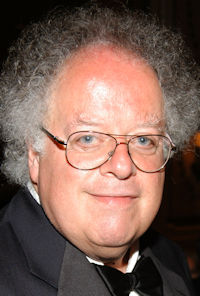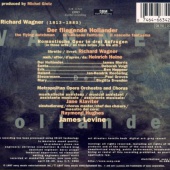James Levine’s broadly paced reading clocks in at a timing close to those of
Knappertsbusch and Klemperer, but whereas those conductors make the music seem ponderous,
Levine maintains a strong line of dramatic flow and action which builds to powerful climaxes.
His superbly responsive orchestra and chorus are caught in rich, vivid sound making for a
splendid listening experience.
Levine’s approach is also highly individual. Although the climactic moments have
plenty of power, he also treats many scenes as intimate, interior monologues, particularly the
Dutchman’s major monologues in Act 1 and Act 2. Even some of Erik’s music, usually sung
rather hysterically, is treated lyrically and sensitively. This approach can only work if the singers
have the ability to sing softly without losing expressiveness, and the cast in this recording rises
ably to the challenge. James Morris’ intimate approach to the major monologues is a beautiful
example of intense, expressive singing with hushed sound, and Levine and the orchestra are with
him every step of the way. (When Morris first began preparing the major Wagnerian roles, he
coached some of them with Hans Hotter, whose combination of power and intimacy had been a
part of his unique mastery of this repertoire.)
All of the singers in this richly satisfying performance were caught in their vocal prime.
Deborah Voigt’s warm, plangent tone and intense involvement were ideal for Senta and Ben
Heppner’s easy command of the tricky tessitura of Erik’s music, combined with Levine’s lyrical
treatment of passages that can seem frantic, allows the character to come through as a genuinely
sensitive and appealing rival to the mysterious Dutchman. Bass Jan-Hendrik Rootering is a
warm-voiced Daland and tenor Paul Groves makes an appealing interlude of the Steersman’s
sleepy serenade. This is an outstanding performance and strongly recommended.






